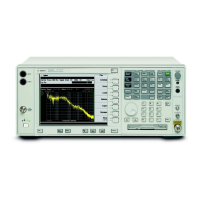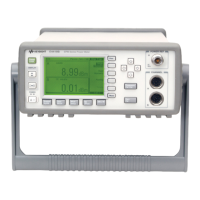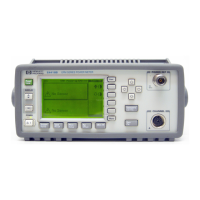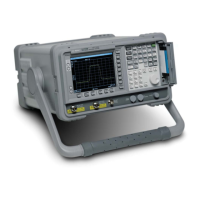100 Chapter 3
Making Measurements
Modulation Rate Measurement
NOTE The Modulation Rate measurement is used in conjunction with the following three
measurements:
• “AM Depth Measurement” on page 82
• “FM Deviation Measurement” on page 87
• “PM Deviation Measurement” on page 93
Step 6. To adjust measurement settings, press
Meas Setup, then:
1. To change the IF BW, press the
IF BW key and enter the bandwidth value and
unit. Meanwhile, the
IF BW Type will be automatically set to Man. The default
setting is
100 kHz.
2. To change the IF BW Type, press the
IF BW Type key to select from Auto, Man
and
Min.
Usually
Auto mode is sufficient for most measurement conditions. When you
need to measure low rate signals, you can select
Man type to set the actual
signal bandwidth by pressing
IF BW.
Selecting
Min type allows you to use the minimum IF bandwidth to perform the
modulation measurement. The minimum IF bandwidth is set as twice wider
than Low Pass Filter.
NOTE If you specify a Low Pass Filter, it’s recommended to select Min:
IF BW > 2 * LP Filter
3. To change the average number between
On and Off, press the Avg Number key.
When setting to
On, enter the number. The default average setting is Off and the
default number is 25 when switching to
On. When the input signal is changed
during the average period, wait until the averaging is done or the next
averaging period starts.
4. To change the average mode, toggle the
Avg Mode key between Exp and
Repeat. The default average mode is Repeat.
Step 7. To adjust the detector, press
Det/Demod, Detector to select a detector:
1. Pressing the
PEAK− or PEAK+ key allows you to check modulation symmetry.
2. Pressing the
PEAK+-/2 key allows you to display the average value of the
positive and negative peak readings.
3. Pressing the
RMS key allows you to select the average detector.
4. Toggle the
Peak Hold key between On and Off. The default setting is Off.
Step 8. To adjust the filters, press
Det/Demod, then:
1. Press
High Pass Filter to select a value.
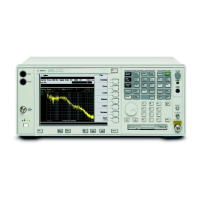
